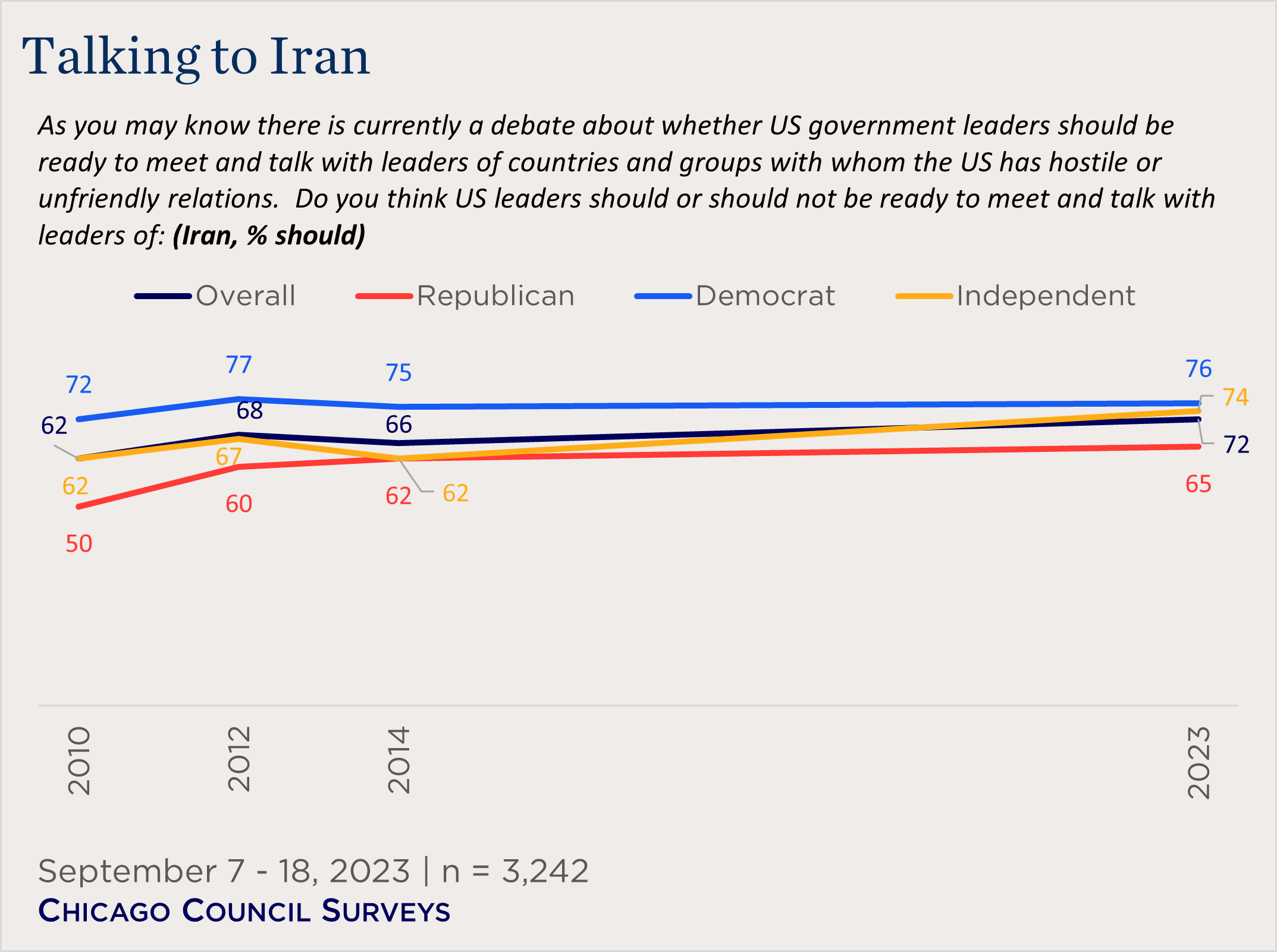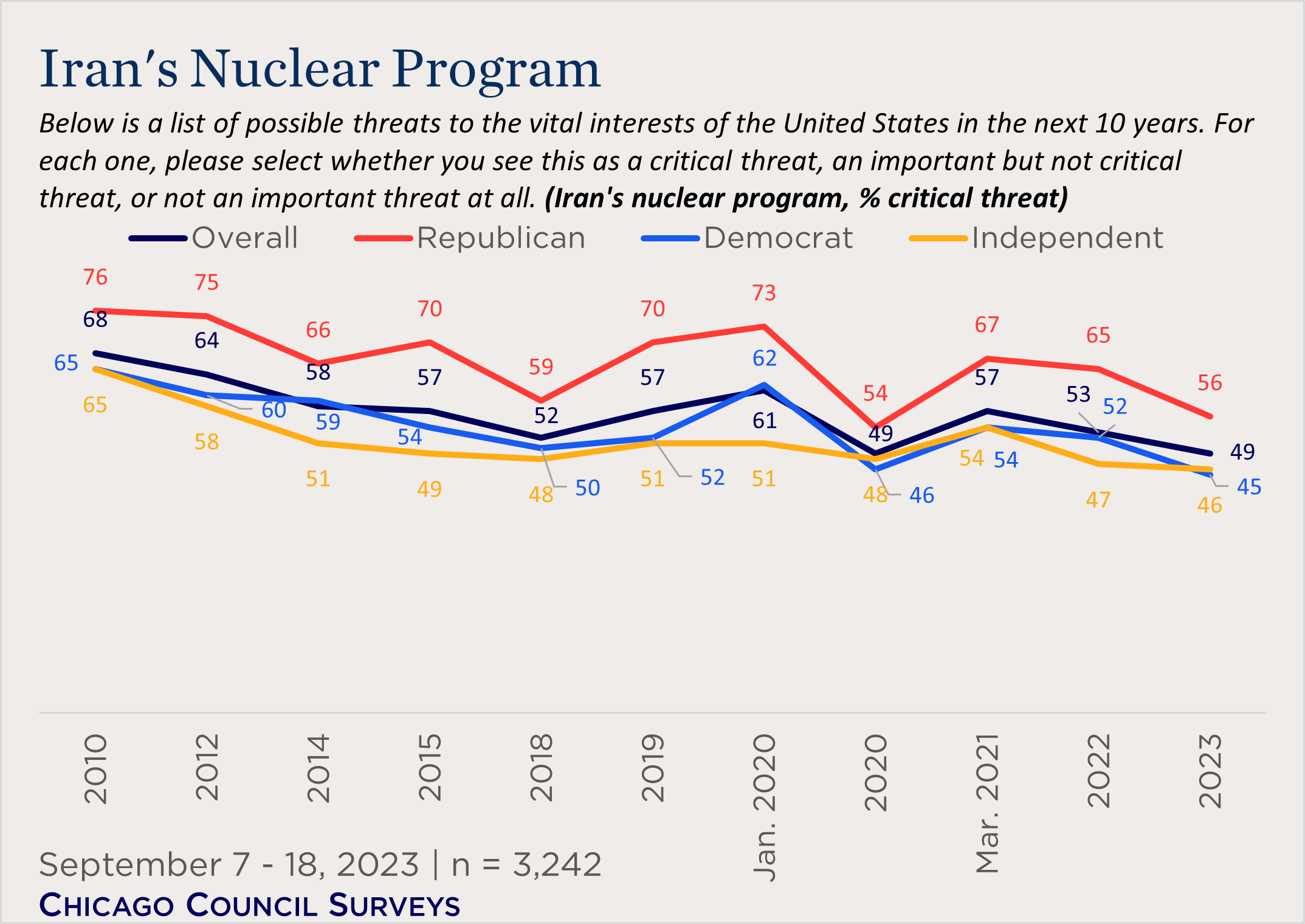Most Americans Supported Talks with Iran Prior to Hamas Attacks

But public opinion has likely shifted following Hamas' attacks on Israel.
The Middle East appears on the brink of a wider regional conflict after the October 7 Hamas attack on Israel that may draw in Iran and the United States. Just before the outbreak of hostilities, the 2023 Chicago Council Survey of Americans—conducted September 7-18, 2023—captured one of the lowest levels of US public concern about Iran reported since 2020. But should the conflict widen and bring Iran into direct conflict with Israel and/or the United States, these numbers could shift dramatically.
Before Attack, Majority of Americans Open to Diplomatic Talks with Tehran
Iran and the United States have not had formal diplomatic relations since April 1980. In 2002, Iran was included as part of the “Axis of Evil” in George W. Bush’s State of the Union address. More recently, there has been great concern about Iran’s nascent nuclear program and its bankrolling of organizations like Hezbollah and Hamas. Even so, the American public remains supportive of direct talks between US and Iranian leaders. Seven in 10 (72%) Americans say US leaders should be ready to meet and talk with the leaders of Iran. That is an increase of 10 percentage points since the question was first asked in 2010 when it was 62 percent.

Majority of Americans Favored US Participation in Iran Nuclear Deal
The lack of diplomatic relations has severely curtailed talks between the two countries. The US withdrawal from the 2015 Joint Comprehensive Plan of Action, more commonly known as the Iran nuclear deal, further damaged relations.
At this point, however, the American public continues to favor US participation in the nuclear deal. In 2023, 63 percent said the United States should participate in the agreement that lifts some international economic sanctions against Iran in exchange for strict limits on its nuclear program for at least the next decade. This attitude is consistent since the question was first asked in 2016, when it was 60 percent. Perhaps most striking is a majority of Republicans (55%) also favor participating in the Iran nuclear deal—a new high. The previous high among Republicans came in 2018 when it was 52 percent, but in all other years it was a minority. For their part, roughly three-quarters of Democrats favored participation in the Iran nuclear deal since the question was first asked in 2016.
Americans Felt Less Concerned about Iran Nuclear Threat Than in Past
At the same time, the number of Americans who say Iran’s nuclear program is a critical threat to the vital interests of the United States has declined significantly over the past decade. In 2010, 68 percent said identified Iran’s nuclear program as a critical threat to the United States while 49 percent say the same today—one of the lowest readings of concern since the question was first asked.

These results offer an interesting look at American attitudes on Iran at a time when the US foreign policy and news coverage was on the war in Ukraine. Relations between the United States and Iran were icy—but still peaceful. As the potential for conflict increases, these attitudes could shift quickly and will bear watching.
This analysis is based on data from the 2023 Chicago Council Survey of the American public on foreign policy, a project of the Lester Crown Center on US Foreign Policy. The 2023 Chicago Council Survey was conducted September 7-18, 2023 by Ipsos using its large-scale nationwide online research panel, KnowledgePanel, in both English and Spanish among a weighted national sample of 3,242 adults aged 18 or older living in all 50 US states and the District of Columbia. The margin of sampling error for the full sample is ±2.0 percentage points. The margin of error is higher for partisan subgroups or for partial-sample items.
Partisan identification is based on how respondents answered a standard partisan self-identification question: “Generally speaking, do you think of yourself as a Republican, a Democrat, an Independent, or what?”
The 2023 Chicago Council Survey is made possible by the generous support of the Crown family, the Korea Foundation, and the United States-Japan Foundation.


Related Content
 Public Opinion
Public Opinion
Poll finds a majority of Americans value the US security partnership with Israel but say the status quo between Israel and Palestinians is unacceptable.
 Defense and Security
Defense and Security
Explore the complex history of the Gaza Strip, the rise of Hamas, and the implications for the current conflict.
 Public Opinion
Public Opinion
In the event of Iran developing nuclear weapons, the US public wants to tighten economic sanctions, and most support a return to the JCPOA.
